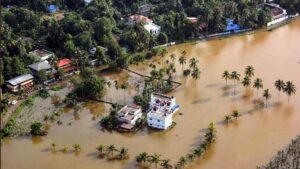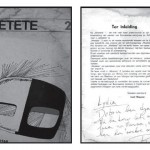Capitalism And The Generation Of Non-Relational Patchworks
No Comments yetFelix Guattari’s The Three Ecologies first came out in 1989 (As Catographies Schizoanalytiques). I bought a translation in 2011, when the research I was at, on urban processes in the south western India state of Kerala, was yet to wind up. Perhaps the most significant pointers were towards the complex relationships that have always been there but becomes starker in what he calls ‘integrated world capitalism’.
The United Nations Environmental Programme (UNEP) had started off in 1972. This was preceded by significant environmental movements across the world in their different orientations from conservation of ecology, wildlife, realization of pollution and rural community interventions. Though Joseph Fourier and Svante Arrhenius by the end of 1800s started talking the science of greenhouse effect, this was yet to be accounted for in the complex relationships that have epochal effects like the anthropocene, when Guattari was at work. The work gets more interesting as the trope of ‘network’ was yet to have internet as a metaphor and globalization as an idea replete with abstractions that went along, was still to be a key word.
The Three Ecologies prompted me, by the completion of my then enquiries, that the complex relationships that manifested in changing phases of urbanisation in ecological contexts could well be stretched further from. Years hence the work comes back at me, now through some unavoidable vignettes that were less noted before. I quote one here:
“Now more than ever, nature cannot be separated from culture; in order to comprehend the interactions between ecosystems, the mechanosphere and the social and individual Universes of reference, we must learn to think ‘transversally’. Just as monstrous and mutant algae invade the lagoon of Venice, so our television screens are populated, saturated, by ‘degenerate’ images and statements [enonces]. In the field of social ecology, men like Donald Trump are permitted to proliferate freely, like another species of algae, taking over entire districts of New York and Atlantic City; he ‘redevelops’ by raising rents, thereby driving out tens of thousands of poor families, most of whom are condemned to homelessness becoming the equivalent of the dead fish in environmental ecology.” [P. 43, The Three Ecologies, 2000]
Specifics like Donald Trump who along with other right-wing figureheads as paradigms of threats to life, degenerate images and statements that characterize these symbols, driving out of people, metaphors from non-human ecology; all of these are too big to miss. But so are the reminders of recognizing connectivity, and the need to think transversally.
Such needs got pressing during specific events of recent times. The ecological disasters from different places, demonetization, or the pandemics can prompt transversal thoughts on relationships. The top-down imagination of ecologies and economies; with the add-on provisions to provide capital to corporates; have already resulted in the biggest socio-ecological disasters in the sub-continent. Urban spaces in the contemporary times, have demonstrated that it is not the virus itself that kills, but it works in synergy with the uneven terrains and absence of care as was evident in the Indian scenario with only a few exceptions. With the coordinates of daily rhythms overwhelmingly set by the virus and its trajectories, it has become even tougher to separate ourselves from the contingent and contexts we are thrown into every day. Risk societies, urban informalities, everyday precarities, techno-social deployments, or surveillance and pastoral orders have scaled our skins and rewired our bodily rhythms, to such an extent that only a transverse thinking and parliament of things (Latour 1991) can get us anywhere.
The Working Group of the Subcommission on Quaternary Stratigraphy who deliberate on whether the anthropocene, could be an ‘official geological era’ has not decided which human impact has been the most comprehensive. Many pin the time period on the Columbian exchanges when European colonial process (from 1600s to 1700s) saw a coming together of industrialization, exchange of labour and raw materials, or rapid transformation of ecosystems like in the Americas.
The massive extraction of fossil fuels post world war two has been another significant point of time, and so are the increasing levels of nuclear tests after the 1960s (traced in the presence of increased radionuclide). All this brings in a major obligation in terms of historical, political and philosophical reconceptualisation of life, non-life, and the networks of relationships in terms of human impacts. The accustomed ways of thinking that kept human culture as separate from nature obviously is problematised. Presently, the pandemic order has only reiterated the inextricable links and relationships between hybrid systems that were earlier spliced up into nature and culture.
The need is pressings to dwell upon relationships between hybrids, that events like pandemics or demonetizations, makes visible the complex networks during ecological catastrophes. In a way, events of specific environmental catastrophes, top-down economic decisions, or the mishandling and thus making of a pandemic order; brings to fore what is otherwise unrecognized.
There needs to be a reconceptualisation of humanities and social sciences, as well as other branches of sciences, not just in terms of the ways and politics of humans produce knowledge of humans; but the ontological effects of non-human that relate from within and outside, through time and space (Saldanha and Stark 2016).
Deleuze and Guattari’s A Thousand Plateaus (1987) maps the inhuman systems that subtend the distinct flows, and aggregates of species and relationships. Guattari in The Three Ecologies (2001) talks about ecological disequilibrium. He distinguishes the three interwoven ecologies: social, subjective and environmental.
There is the concept of mechanosphere coined by Guattari to understand the intermeshing of mechanical, architectural, and biological processes. This necessitates both the long duree understanding as well as a politically informed understanding of relationships that helps to situate anthropocene not as a passive homogenized context. In addition, this has also facilitated the complex understandings of bigger histories- with history connected to astronomy, geology, or evolutionary history. Deleuze and Guattari’s A Thousand Plateaus is an attempt at such conceptualisations.
There are always divergent tendencies about the experience of what is considered the anthropocene. On one hand is an all-encompassing effect, but there are others like the indigenous experiences of inscribing life through the non-human life, meanders of rivers and battles between the human and extra-human. Anthropocene throws open a possibility if understood in Deleuzian reading of strata. This goes beyond constituting understanding in the ‘either-or(s)’ of anthropocene, capitalocene, plantationocene etc. The field could be understood as a coming together of contradictory tendencies, on strata, based on the varying degrees of relationships as well (Colebrook 2016). So, there could the human moral agent who discovers one to be a geological force, but also there is a possibility ‘man’ not being such an agent of change in particular, but rather folded into relationships between human and non-human.
Thinking stratigraphically is also helpful in thinking of a world where on the one hand nothing other than exchange could be dominant and where no other value, except, entering the market is important; on the other hand, there is a coexistence of starkly different political orders globally.
The neoliberal reading of environment, in the environmental governance discourse has a ‘service’ based understanding of non-human world. The three ecologies of Guattari have a relational view with co-implications. Several modes of production have been integrated, totalized into a totalitarian capitalist functioning. Capitalist system is characterised most by neutralizing existential refrains and by a general equivalence, flattens value and subsumes everything in hegemony. One of the responses to climate change has been to support micro economic ventures that are non-standard in small states, which is much easier done than making any alteration in major carbon generations in big economies and powerful states (Bignall et al 2016).
Equivalence is evidently a hegemonic exercise. The arbitrary equivalences created in carbon trade, carbon market as well as similar system sustaining algorithms, and thereby sustainable development, now stands exposed. In fact, CO2 has now become the fetish or ‘thing’ around which our environmental aspirations have galvanised (Swyngedouw 2018). The kind of reification has been set in motion ever since the Kyoto protocol, through off setting. There has not been an institutional reflection on finance capital mediated reifications and fetishizations as one moved from Paris to COP 26 UN Climate Conference at Glasgow.
The reification of complex processes to a thing-like object-cause in the form of a socio-chemical compound around which our environmental desires crystallize is, furthermore, inscribed with a particular social meaning and function through its enrolment as commodity in the processes of capital circulation and market exchange (Bumpus and Liverman, 2008; Liverman, 2009). The commodification of CO2 – primarily via the Kyoto protocol and various offsetting schemes – in turn, has triggered a rapidly growing financialized market in greenhouse gas commodities.
Further, ecology as ‘resource management’ seeks to bring into focus stable stock levels, maximum environmental utility and emphasise a certain type of resilience perceived in terms of species imagined to have a discrete existence. The latter does not take a relational point of view.
In addition, in the philosophy of maximum utility, capitalist value, and enforced equivalence; resilience is never a matter of choice. Rather it is an effect of ‘there being no alternative’.
Different species, including humans, enter into an affective understanding (knowledge) of ecologies they are constitutive of and gain a perspective in relationship t each other. This is unlike discrete and individualistic imaginations that inform ideas of imposed equivalence.
Perspectives rather ‘emerge’ in the value laden- political contexts. One of the examples of formal recognition given to such perspectival knowledge is the agreement signed by south Australian government with Ngarrindjeri authorities in order to protect and engage with indigenous knowledge. The Kungun Ngarrindjeri Yunnan Agreements (KNYA) recognises the authority of certain forms of knowledge within a nation- state jurisdiction. This de- facto recognition (p: 468-469, Rigney et al 2008) is not yet de jure in the constitutional order. But this is significant in terms of exclusion of large number of people in the language of exception in the Special Economic Zones and Urban impositions. There is of course the fact that the reference is still to human species and that the recognition given is only de facto.
References:
Swyngedouw, Erik. 2018. “CO2 as Neoliberal Fetish: The Love of Crisis and the Depoliticized Immuno-Biopolitics of Climate Change Governance”. In Damien Cahill et al (Eds) The Sage Handbook of Neoliberalism. Sage: London: 295-308.
Saldanha, Arun and Hannah Stark. 2016. “A New Earth: Deleuze and Guattari in the Anthropocene’ in Deleuze Studies, Vol. 10 Number 4: Edinburg University Press: 427-440.
Colebrook, Claire. 2016. “A Grandiose Time of Coexistence: Stratigraphy of the Anthropocene” in Deleuze Studies, Vol. 10 Number 4: Edinburg University Press: 440-455.
Bignall, Simone, Steve Hemming and Daryle Rigney. 2016. “Three Ecosophies for the Anthropocene: Environmental Governance, Continental Posthumanism and Indigenous Expressivism” in Deleuze Studies, Vol. 10 Number 4: Edinburg University Press: 455-479.
Rigney, D., S. Hemming and S. Berg. 2008. ‘Letters Patent, Native Title and the Crown in South Australia’. In M.Hinton, D. Ringney and E. Johnston (Eds.). Indigenous Australians and the Law. New York: Routledge: 161-78.
Deleuze, G. and Guattari, F. 1987. A Thousand Plateaus: Capitalism and Schizophrenia. Minneapolis, MN: University of Minnesota Press.
Guattari, Felix. 2001. The Three Ecologies. (Trans. Ian Pindar, Paul Sutton). Athlone Contemporary European Thinkers.
Dr Mathew A Varghese
Faculty, School of International Relations and Politics, Mahatma Gandhi University
Director: Centre for Urban Studies, M G University
You May Also Like
Comments
Leave a Reply








